Healthy Bottle Feeding: How to Be Responsive with Alison Ventura, PhD
In this episode we're talking about:
- HOW to read baby's cues and follow their lead…even when you're tempted to pressure feed
- WHY we need to step back and support our baby's autonomy as they learn to self-feed
- WHAT emotional support at mealtimes looks like…it's easier to do than you think!
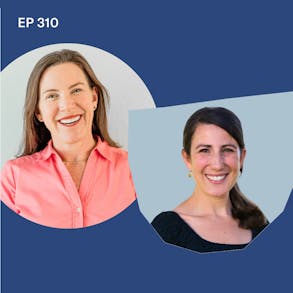
LISTEN TO THIS EPISODE
Episode Description
What is responsive bottle feeding? How can you be a more responsive bottle feeder with your baby and how does that impact infant health and development? My guest is Alison Ventura, PhD a researcher who studies responsive bottle feeding and who will be sharing some easy tips for implementing responsive feeding throughout infancy, whether that’s breastfeeding, bottle feeding or when you start solid foods.
About the Guest
- Dr. Alison Ventura is a PhD researcher at CalPoly San Luis Obispo who runs the Healthy Kids Lab

- Dr. Ventura’s research looks at responsive bottle feeding approaches and how this impacts infant health

Links from this Episode
- Dr. Ventura’s lab’s responsive bottle feeding page is here: https://healthykids.calpoly.edu/ResponsiveBottleFeeding
- Healthy Kids lab YouTube video showing responsive bottle feeding is here: https://www.youtube.com/watch?v=NLnPGJKdPUw
- Dr. Ventura’s personal website linking to her responsive feeding book is here: https://www.alisonkventura.com/
- Promoting Responsive Bottle Feeding within WIC article (JAND) is here: https://www.jandonline.org/article/S2212-2672(21)00304-X/fulltext
- Baby-Led Weaning with Katie Ferraro program with the 100 First Foods™ Daily Meal Plan, join here: https://babyledweaning.co/program
- Baby-Led Weaning for Beginners free online workshop with 100 First Foods™ list to all attendees, register here: https://babyledweaning.co/baby-led-weaning-for-beginners

Latest Episodes
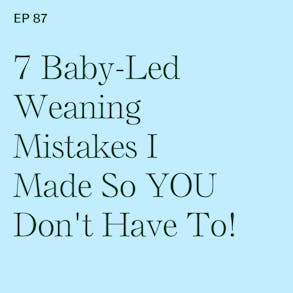
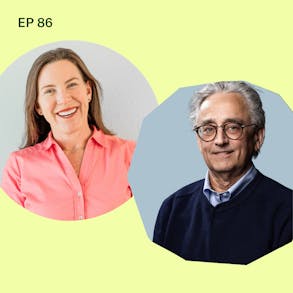

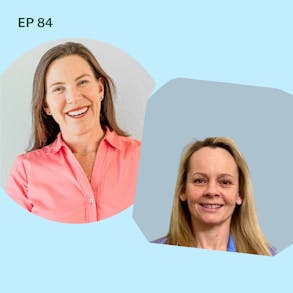
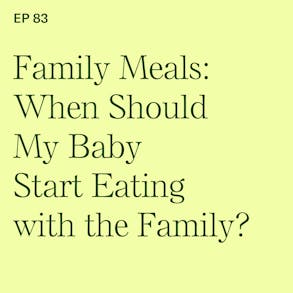

0 (0s):
How are you feeling about your baby starting solid foods? I was just working with a friend whose baby recently turned six months of age and she's like, I wanna do this. But it just like seems like so much work. I don't know what foods to make and I'm scared. So if you are feeling apprehensive or anxious about your baby transitioning to solid foods or you're struggling to find time, like my friend was skipping days, I'm like, please don't skip days of solid foods. Maybe you start a baby-led weening and you're like feeling stuck like she is. Or you're gonna give up cuz you're not sure if you're doing this right. If any of this speaks to you, I wanna invite you to my brand new one hour comprehensive online video workshop called Baby-led Weening for Beginners. I think this is going to ease a lot of anxiety for you about helping your baby start solid foods safely with baby-led weening.
0 (41s):
I just redid the free training. It's packed with videos and visuals on how to safely prep foods for baby-led weening, what it looks like the first few days, and then how to reduce choking risk. Everyone on this free training gets a copy of my original hundred first foods list cuz I never want you to run out of ideas of foods that your baby can eat. Next, you can get signed up for this week's video workshop times if you go to baby-led weening.co. Again, that's baby-led weening.co for the free one hour-ish. Sometimes the q and i runs a little long, I'm gonna be honest. But if you have an hour that you can commit to learning everything you need to give your baby a safe start to solid foods, come sign up for this workshop. Again, that website baby-led weening.co and everyone on the free workshop gets a copy of my hundred first foods list.
0 (1m 22s):
Hope to see you there, baby led weaning.co.
1 (1m 26s):
Basically it's that idea that it's a way of feeding children that's very responsive to what the child is bringing to the table. So part of that is their expressions of hunger and fullness. When a baby is hungry, knowing that they're rooting and dying on their fist or getting bussy knowing that when a baby is full they're slowing their pace of feeding and looking satisfied and settling down a bit.
0 (1m 52s):
Hey there, I'm Katie Ferraro, registered dietician, college nutrition professor and mom of seven specializing in baby-led weening here on the baby-led weening made Easy podcast. I help you strip out all of the noise and nonsense about feeding, leaving you with the confidence and knowledge you need to give your baby a safe start to solid foods using baby-led weaning. Well. Hello and welcome back. My guest today is Allison Ventura. She's a PhD researcher at Cal Poly San Luis Obispo in California. And Dr. Ventura has recently been looking at responsive bottle feeding techniques in her research and then analyzing how those impact infant and child health down the road.
0 (2m 36s):
So whether you are pumping and feeding breast milk out of a bottle or formula, feeding formula out of bottle, if you are bottle feeding, there are a few techniques you can employ to get and stay connected with your baby when feeding, but also be listening to and looking for and responding to your baby's hunger and fullness cues. And Allison's team has found that the responsive bottle feeding techniques that she's gonna be talking about today have been shown to help prevent rapid weight gain in infancy. And in this interview she's gonna talk a little bit about responsive bottle feeding as a technique and personally the reason I'm so passionate about responsive feeding techniques across the board, be it if you're breastfeeding or bottle feeding or doing solid foods is when you look at baby-led weaning. If you ask me that's the ultimate responsive feeding method, but at the same time your baby is learning how to eat solid foods, you're also still providing nutrition from infant milk, right?
0 (3m 25s):
Be that breast milk or infant formula. So we want to be consistent in the larger responsive parenting realm so that we're successfully helping to foster what will eventually become independent eating in our children. So with no further ado, here is Dr. Allison Ventura talking about healthy bottle feeding and how to be a responsive bottle feeder.
1 (3m 47s):
Hi, I'm so glad to be here. Thanks for having me.
0 (3m 50s):
Before we get started, could you share a little bit about your background, the work that you do in infant feeding and starting solid foods in particular?
1 (3m 56s):
Sure. So I'm currently an associate professor of kinesiology and public health at the California Polytechnic State University. But how I got to this place was I have training in psychology as well as a a master's in nutrition and doctorate in human development and family studies. So I combine those degrees in thinking about early feeding interactions. I'm particularly interested in parents and parenting and really how they are interacting with their young children during mealtimes and how that might be influencing the development of eating behaviors and dietary preferences and ultimately health outcomes.
1 (4m 39s):
I've always just been really interested in not only how parents influence their children but how children influence their parents. So what's kind of the back and forth that's happening early on that's really shaping both who the parent is as a a parent but also the the child and their outcomes. So I'm particularly interested in, in infant feeding and thinking about you know, breastfeeding bottle feeding and the introduction to solid foods because it is such a important time for prevention, right? We know this is when all these early habits and and preferences are are really starting and I've always just really connected with the idea of of prevention and helping families during this really sensitive window where the parents are learning so much right alongside their baby.
1 (5m 23s):
And so how can we really support parents during this exciting but overwhelming time when they need so much support and education and just how can we meet parents where they, where they are to give them the support they need within their specific family context. And
0 (5m 38s):
I was looking at your CV and preparing for the interview I thought was so interesting like your kind of the combination of okay psychology background but also nutrition and then your PhD is in early childhood development, is that correct?
1 (5m 49s):
It's actually human development and family studies. That's so interesting. Yeah. Not only how we develop but like family interactions. Like what are these things that happen within our families that really shape who we are?
0 (6m 1s):
And I love what you said that it is sometimes like the babies who are changing us as parents and we routinely will hear from parents who are like, Katie, listen I never gave two, you know what's about what I ate before I was either pregnant and then having to kind of shape up cuz I'm building a new life or now this baby's here. Okay, first six months fine, but now we're starting solid foods and I have to think really critically about oh my gosh we eat takeout every day or fast food and and that's certainly fine but, but babies can't eat that and we know that and so we have a lot of parents like hey I just kind of wanna do a reset. And so I just, I love getting to speak with other feeding experts such as yourself. And I know this idea that we're gonna talk about today, responsive feeding kind of a newer term maybe it's some of our listeners are hoping to hear more about. So I wanted to ask you, what is responsive feeding and then if you don't mind adding in, how are responsive feeding practices in infancy linked to health outcomes later in life?
1 (6m 51s):
Sure. Yeah, so responsive feeding really has been becoming more of a buzzword and we're seeing it more and more in our input feeding guidelines and the education. But it is a term that might be a little bit fuzzy if you're not, you know, familiar with the jargon. So basically it's that idea that it's a way of feeding children that's very responsive to what the child is bringing to the table. So part of that is their expressions of hunger and fullness. So making sure that as parents and caregivers we understand the ways that young children communicate that they're hungry and full because we know that's not always through words because babies don't have those words. So when a baby is hungry, knowing that they're rooting and dying on their fist or getting fussy knowing that when a baby is full they're slowing their pace of feeding and looking satisfied and and settling down a bit, being able to know these cues, recognize them and then feed in response to them, that is really the essence of responsive feeding.
1 (7m 52s):
But more broadly it's also understanding what's developmentally appropriate, like what can we expect at different stages and understanding that feeding is not just about getting calories and vitamins and minerals into our children, but it's a lot more than that, right? That feeding is also a time for social-emotional growth, fostering for cognitive growth, fostering for making eye contract relationship building, communicating our culture to our children. And so I think responsive feeding really represents this appreciation for number one, what children bring to the table and that they are a valuable partner in any feeding interaction that they should be watched and listened to and responded to.
1 (8m 35s):
But also appreciating just the broader significance of feeding as a place for learning and relationship building.
0 (8m 43s):
I love the idea of bringing the kids to the table and that's one of the tenets of baby-led weaning. I teach, I'm a dietician and I teach at San Diego State University as well in our nutrition program in which I teach a cultural foods class and one of the assignments that that we do is kind of looking at analyzing the transition to solid foods around the world in different food cultures and that we're the only one that really like shoves an arbitrary amount of pureed commercial packaged food in a baby's mouth and says like this is how we start solid foods. And so I think this idea of like studying the way other cultures start, the transition to solid foods is so important and something that's really overlooked in our society. We, we celebrate so many things but we don't celebrate the transition to solid foods. And so I love this idea of kind of celebrating the baby's place at the table.
1 (9m 26s):
Yeah and I mean it should be a, a really fun time when they're, there's just so much learning that's going on for the parent about their child but the child about their family as well. And so we really wanna be able to protect that the, the significance of that.
0 (9m 40s):
So what about this idea of linking it yeah down the road, like obviously it sounds great to like listen to your child but like is it tied to any particular health outcomes as far as you know?
1 (9m 50s):
Yeah, so we can think about this in the number of different domains, right? So if we think about the actual nutritional outcomes, so thinking about the development of eating behaviors and dietary patterns, it's thought that responsive feeding primarily is really important for supporting abilities to self-regulate. And what this means is the ability to eat when hungry and stop one full, we think this is really important, right? That ultimately we would hope this for everybody that we're really good at knowing when we need to eat, eating the right amount and then feeling when we're full and stopping eating when are full. And many of the issues that many of us have with food in our current food environment is that there's so much food, there are so many opportunities to eat, we eat when we're not hungry but because food is available or it looks delicious and all these types of eating behaviors are linked to overeating and obesity.
1 (10m 46s):
And so ideally with responsive feeding we are trying to provide some resilience against that because we're teaching babies when you're hungry you feel it and this is what hunger feels like and what you do in response to that sensation is eat when you're full, this is what fullness feels like and and when you feel that you should stop eating and when we have a context that's really supportive of that, we would hope that a child would develop the ability to really kind of understand how to eat in response to their needs instead of in response to maybe other non-food related needs like emotions or tiredness or all these other emotional eating contexts. And emerging research is linking responsive feeding to healthier weight gain patterns for babies as well.
1 (11m 31s):
But then more broadly there are other, other benefits too. As I mentioned, we know that responsive parenting, there's a lot decades of research supporting the importance of responsive parenting for children's outcomes that parents who are responsive to their children's emotions and responding in ways that are developmentally appropriate have children who better learn how to manage their stress and respond to negative emotions and you know, regulate their emotions in healthy ways. So responsive feeding can really be seen as a a facet of responsive parenting and really sup having parents support children in the ways that they need to develop all these important life skills that, that are really healthy foundation for their future.
0 (12m 14s):
What does the term responsive bottle feeding mean then and what does it mean to be a responsive bottle feeder?
1 (12m 22s):
Yeah, so a lot of our research has, has really focused on this facet of feeding and I'll, I'll just give you a little background that we traditionally think of responsive feeding in the context of breastfeeding because it's such like a, a central message to breastfeeding of like recognizing your baby's cues and feeding in response to those. Because during breastfeeding we don't have these contextual cues around how much is being offered and how much is consumed and how much is left. So for breastfeeding it's a really natural compliment of like teaching about baby cues and responding to those cues and we know that that's a really important support for breastfeeding, but we've really tried to take a lot of those great messages that are conveyed within breastfeeding education and apply those to bottle feeding because you know, bottle feeding parents need, need this education as well.
1 (13m 12s):
And so responsive bottle feeding would really be what I described related to responsive feeding is if you're bottle feeding, you're, you're still responding to your baby's cues, you're still initiating the feeding when your baby's showing hunger cues, you're facing the feeding and response to the behavioral cues your baby is displaying and you're ending the feeding when the baby displays satiation cues. And this is maybe counter to some messaging around bottle feeding, which is often focused on how much to put in the bottle and how much you should expect your baby to eat and how frequently you should feed, which all of those are are kind of just prescriptive and it might be different for each baby and for each day.
1 (13m 53s):
And again, these are things we often talk about with breastfeeding is some days your baby might eat a little, some days your baby might eat a lot, some days your baby might. And all those things can happen with bottle feeding too. If, if we're following our babies in their cues and what they're telling us they need,
0 (14m 9s):
Hey we're gonna take a quick break but I'll be right back.
BetterHelp (14m 17s):
This episode is sponsored by Better Help. I know a lot of you are multitaskers cuz you're taking care of a baby, you're listening to the podcast, you're driving to work baby, doing housework, life is busy and trying to parent on top of doing life can be overwhelming. Working with a therapist can help get you closer to the best version of you. So when better help approach us to sponsor the podcast. At first I wasn't totally sure because I know how important therapy is for people who have experienced major trauma, but I've also learned how therapy can help with things like setting boundaries, which I know I definitely needed help with. I mean if it's not directly related to my family life or my work, I don't prioritize it. My better Help therapist Brooke recently gave me self-care homework, which you guys I actually did not realize was something that I needed. And honestly just having someone to talk to in a non-judgmental space is so important. Better help offers convenient, flexible, affordable therapy totally online. You fill out a brief questionnaire and get matched with a licensed therapist. If you had to better help.com/weaning, you can get 10% off your first month. That's better help H e L p.com/weaning.
1 (15m 23s):
We, it's so funny because in the second half of infancy when you start solid foods, we always tell hers, hey it's the same baby, like nothing changed here. You gotta employ that same skillset and same thing when parents are like, can you please tell me exactly what the portion sizes are for a six and nine and 12 month old?
0 (15m 36s):
I was like, no they're arbitrary, they're made up, they're prescriptive when you see them, someone just pulled them out of thin air, your baby's going to eat a lot of one thing one day, nothing the next day act like they've never seen it, love the thing that they hated yesterday and so on and so forth. It's the same baby. So there's really no hard and fast rules about how much you should have. And you're right with bottle feeding, I mean obviously a lot of times, and I know this as a parent of seven kids, I was never able to exclusively breastfeed any of my babies and I always relied on pumping and formula and bottle feeding and like, well about how much can I expect them to eat? But of course, you know, every baby is different but as a parent, especially if you're not breastfeeding, you're like, I've always feeling guilty about it. Like I wanna do as good of a job as I can. So even I find myself as a dietician looking up the charts and you know, Kelly mom or whatever, how much are they supposed to have when they're this old just to see like am I kind of close?
0 (16m 22s):
But I, you can see for a lot of parents how that could kind of spiral into oh my gosh I'm not doing a good enough job and there's already so much pressure around feeding your baby that I love the idea of responsive feeding and telling parents that kind of go back to listening to your baby. Now you mentioned like some of the things that are, I'm not saying not responsive but could you give us examples? I remember seeing at the California WIC Association a couple of years, they did a, a pre-conference and they were showing some videos of like, and obviously they had staged these but like non-responsive bottle feeding like moms on her phone, she's like trying to force the baby to finish the things like obviously it's being dramatic but can you give ideas of things that are not responsive that we would maybe wanna steer clear of?
1 (16m 57s):
Yeah, so you, you provided some great examples but I think feeding on a schedule would be one, expecting a baby to eat every two or three hours and then also encouraging the baby to eat more. So sometimes we see that parents are concerned if there's still milk left in the bottle and might try to encourage their baby to finish it. We might especially see this with express breast milk, right? Because that's liquid gold, we don't wanna waste any of it. So encouraging the baby to continue feeding even if they're showing rejection or you know, fullness cues would be nonresponsive feeding. We would also consider, you know, using food to soo the baby to a certain extent a form of non-responsive feeding because although we're responding to the baby, we're not responding in a way that's appropriate for their needs.
1 (17m 46s):
So if we have a baby who's fussy because they are just overstimulated or they're tired, if we're using food to soothe those emotions, then we're, we're feeding in a way that's not connected to the actual feeling of hunger. And so that would be outside of our, our definition of responsive bottle feeding. So those are some of the key ways I in it all comes down to feeding a way that's not directly connected to the baby expressing hunger and fullness and not making that nice connection between yeah hun when you're hungry and you stop when you're full but rather feeding in response to other things such as the time of day or the amount that's left in the bottle or how we're feeling the emotions that we might need to deal with.
0 (18m 29s):
So I was really excited when your latest article came out. It was published in the Journal of the Academy of Nutrition and Dietetics, which all dieticians get. So anytime we have all the Google alerts set up for baby-led weaning and responsive feeding and good, I'm glad we're seeing more and more about this. And your particular study was talking about promoting responsive bottle feeding in wic. So could you tell us a little bit about your experience working with wic? First also just inform us what WIC is for those who may not be familiar with the program and then what's WIC doing to promote responsive bottle feeding as an institution?
1 (18m 58s):
So WIC stands for the special supplemental nutrition assistance program for women infant and children. And so it's a federally funded program. Our tax dollars go to support WIC and the charge of WIC is to really provide nutritional support to the most vulnerable, which are our low income mother and infants. We know that pregnant women and new mothers and young infants have really high nutritional demands. It's really important that they eat well during these sensitive windows of development. And so WIC was really designed to target that and make sure that these low resource families get the resources they need to have healthy foods to feed themselves and their children to support, you know, the best health outcomes that that we can.
1 (19m 43s):
And WIC serves really large number of of families and so we know it's a really important target for intervention because they have a huge reach. WIC provides really robust breastfeeding support but they also provide formula for families who are, you know, partially breastfeeding or are fully formula feeding. And actually the majority of WIC families are giving formula to their babies. So even though there are really robust efforts to promote breastfeeding, the reality is that the majority of WIC families are bottle feeding. And so we've always been interested in working with WIC to support them in making sure that they are supporting bottle feeding well and educating their families in the way that they need and kind of noticed in our work with them.
1 (20m 28s):
And I think they've noticed too that there is almost in some instances a lack of support for bottle feeding because nobody wants to compromise breastfeeding, right? And almost a fear of like if you talk about bottle feeding, if you support healthy bottle feeding, that means that you're taking away the support that could be be provided towards breastfeeding. So we've, we've been trying to work with, with clinics on that and trying to understand how we can kind of balance that a little bit. Like let's really protect our support for breastfeeding cuz we know that's so important. We really wanna support all families in meeting their breastfeeding goals. But if the reality is that many families are still bottle feeding, let's support them too.
1 (21m 10s):
Let's make sure we have really good social support and educational materials and what are the other, these families need to, to support healthy bottle feeding. And we know this is really important because research shows us that these bottle-fed babies, formula fed babies are at greater risk for rapid weight gain and overfeeding and you know, they, they are high risk for obesity later on. So that's suggest that they do need support to figure out what's going on. You know, how is, how is bottle feeding different and how can we provide them with the support they need to feed their babies? Well so what we've been do, we've been working with the LA county WIC program to think about this issue and and how you know, we can change some of what's going on WIC clinics to provide additional support for bottle feeding families and they were particularly interested in, in this issue as well because they were seeing that formula feeding families were dropping out of the program earlier than their breastfeeding families.
1 (22m 5s):
We did some qualitative work with families to understand why and some of what they told us was that they were feeling stigmatized for their feeding choices, that if they weren't breastfeeding then they weren't getting as much support from wic. They felt like once their formula benefits ended that there was less of a reason for them to come to WIC cuz that was mainly what they were getting and they just felt like they weren't getting what they needed from wic. And we know from other research too that bottle feeding families feel like they're undersupported, that there's not great resources for them, they're not getting the education that they need. So we really wanted to address this and and make sure that both breastfeeding and bottle feeding families were getting the support they needed.
1 (22m 46s):
So we developed an intervention where part of what we did was to increase the amount of education available to these bottle feeding families and a lot of it was messages around responsive bottle feeding. So helping make sure that not only were the breastfeeders learning about infant cues but bottle feeders were learning this too. That there was emphasis on the importance of feeding and response to infant cues even during bottle feeding. And then we also revamped the assessments they were doing it with in WIC so that they could better highlight potential bottle feeding issues. So instead of just searching for breastfeeding problems and how to address those problems and we made sure that the WIC staff were really well equipped to ask questions around how frequently are you feeding, what are you putting in the bottle, how are you deciding when to start feeding?
1 (23m 35s):
How are you deciding when to stop feeding so that they could identify when families perhaps were feeding on a schedule or not responding to baby's cues or encouraging their baby to finish the bottle and so that then they could provide the education those families needed. And we found that the intervention worked, it helped reduce risk for rapid weight gain for the babies who were exposed to it and it was particularly helpful for the families with the fussiest babies. So these families who are maybe feeding to soothe their babies and feeding their babies more frequently, that those families did less food, use of food to soothe and they were feeding their babies less frequently and they had babies at that lower risk for rapid weight gain.
0 (24m 19s):
Hey, we're gonna take a quick break but I'll be right back.
SurveyMonkey (24m 26s):
Are you enjoying this podcast Then show your support by taking a short listener survey at surveymonkey.com/r as in the letter R slash AirWave your favorite podcasters wanna know about you, your interests and what you think about this show. There's even a place at the end to tell them anything you want. Do you want more frequent episodes? Did you like a particular guest or topic? This is your chance to be heard. It's also a perfect way to support the podcast because your feedback will help them improve the show and find new advertisers that you actually want to hear from. It only takes a few minutes. Plus, as our thank you, you can enter to win a $500 Amazon gift card. So take the survey right now at surveymonkey.com/r/airwave. Again that's surveymonkey.com/r/airwave.
0 (25m 26s):
Can we talk a little bit about this idea of not feeding on a schedule? Cause I know that's gonna be news to a lot of parents' ears because they're coming out of an era where they go on social media and they see all the sleep training people and this is exactly what the sleep schedule looks like and this is what the body, you get the baby on a schedule, get the baby on a schedule and how do you deal with that? Because sleep is not the same as feeding and we should not be feeding babies on a schedule because every day their needs are different. How do you teach that to families when they're coming in? Just so ingrained in this idea of the schedule is, you know, schedules everything around me.
1 (25m 57s):
It's tough, right? And that's part of what maybe preserves some family's sanity is to have a schedule, have some predictability during a time where life is just very unpredictable and changing day to day. So it it is, I empathize for sure and I I have two sons of my own so I I've been through it too and, and now that it was a tough time and so part of my hopeful thinking of, of what we can support families to achieve is getting the, the support they need to be able to roll with the unpredictability, right? If we have families who have other supports, whether it's in-laws or doulas or someone could who can help them kind of manage the stress of managing a household with a, a young infant are managing their lives so that they can be a little more relaxed and go with the flow of their infant.
1 (26m 49s):
I think that's one potential approach and perhaps emphasizing just how important this is, although it may be rough for you, it is really important for your infant to be able to lead things for a while while, while they're sorting them out and that, so I know there has been some work looking at stress management approaches, relaxation training, some of these ways that we can help parents to just kind of deal with the negative emotions or the stress that might come with the, the day-to-day of, you know, adjusting to having young infant will hopefully help with that transition to being able to come off your schedule a little bit and deal with unpredictability so you can let your baby lead the way.
1 (27m 35s):
So
0 (27m 35s):
Let's talk about that when we move into the transition to solid foods. What are some responsive feeding practices that parents and caregivers can employ? We've talked about responsive feeding on the podcast, but like you said, it's a little bit, I like the word fuzzy that you used. So I just like to ask every researcher and practitioner and parent, you know, what is it that you think would be ideal? And especially as a mom of two kids and knowing that like sometimes when the kids are screaming and you're like not being the best version of yourself, stop, take a breath and be like, what is it that I'm supposed to be doing? It's hard to remember what are these things we should be doing during that transition to solid foods?
1 (28m 10s):
Yeah, well I agree with the statement you made earlier, if it's the same baby, just a different context, right? So like remembering all of these great skills that we're hopefully picked up during breast or bottle feeding in terms of listening to cues and watching your baby and making sure that they have an active seat at the table, right where they're, they're really communicating what you need their needs and, and are responding to it. A lot of those same messages apply to solid foods because we really do wanna make sure that this is continued practice for the baby to understand how to eat one hungry and stop one full and not feel external pressures to, you know, eat three bites and clean your plate and you know, eat, eat that amount that someone else is expecting you to because those are problematic feeding practices too.
1 (28m 56s):
And I think especially during the transition to solid foods, you know, keeping it light and communicating the, the message that like this is a learning experience so really your baby isn't getting a ton of calories from solids early on. This is the time for them to learn about flavors and textures and again, communicate your culture to them through the foods you're offering. Making sure that they're seeing mom and dad and brother and sister and grandma, grandpa are whoever's at the table, they're seeing what they're eating and then they're seeing I'm eating the same thing, right? That social, social learning is really important. So like all of this, I think there comes a degree of willingness to trust that it's all gonna be fine and willingness to trust that your baby's gonna tell you what they they need and you really need to understand how to hear them and you know how to respond to them.
1 (29m 47s):
It's the same, same messages when we're thinking about the transition to solid foods.
0 (29m 52s):
One of the things I loved about your article in the journal for the Academy of Nutrition and Dietetics was there was a link to a video that I then went and looked up that you guys had posted on, I think it was on your Cal Poly website showing responsive bottle feeding in practice and it's like you can talk about it till you're blue in your face but, and this is a podcast that we do talk about things toward blue in the face but then to actually like see the mom and blowing these different things, the way you guys kind of mark that video up was really, really cool. So I'm definitely gonna share a link to that, but where can our audience go to learn more about your work?
1 (30m 20s):
Yeah, so our website is a a great place. Our lab has a website where we share a lot of these materials and it's healthy kids.cal poly.edu. I also have a website alison k ventura.com where I've posted materials as well. So also those can be great resources for your audience.
0 (30m 39s):
Well thank you so much for sharing a little bit about your research and the work that you guys are doing. I think this idea of responsive feeding across infancy needs to be talked about more. So I really appreciate you taking the time to do the interview.
1 (30m 50s):
Yeah, this was a lot of fun. So thanks for asking me to be on your show. It was a great time.
0 (30m 56s):
Well I hope you guys enjoyed that interview with Dr. Allison Ventura talking about healthy bottle feeding. I'm gonna link to all of her resources cuz she's done a lot of work in responsive feeding both breastfeeding, bottle feeding, solid food stuff. And we were actually talking after the interview, she reminded me that she has a really interesting line of research in history talking about the development of food preferences in babies. So she's gonna come back on and talk about how babies develop food preferences, which I think will be very interesting to hear from her in that regard again. So all of the references and the resources from this particular episode will be on the show notes@blwpodcast.com slash three 10. And I wanna say a special thanks to our partners at AirWave Media.
0 (31m 36s):
If you guys like podcasts that features science and food and using your brain, AirWave Media has some great podcasts, check them out online. We are online@blwpodcast.com. Thank you so much for listening and I'll see you next time. Okay, you are a loyal listener, I can tell because you're still listening at the end of this episode here, or maybe you're just too far away from your phone to change it to the next episode. But I wanted to ask you for a real quick favor. So recently the baby led Weenie Made Easy podcast joined the AirWave Media Network who helps us with our podcast ads management and every year AirWave conducts a listener survey to help gain more insight into who is listening to which show.
0 (32m 17s):
And I know you guys like things like Real Food and Responsive Feeding and respectful Parenting, baby wearing Montessori, some or none or all of those things. But AirWave wants to hear from you via this listener survey so that the ads that you hear on this show are of use and of interest to you. It only takes a few minutes to complete the listener survey and you can be entered to win a $500 Amazon gift card at the end of of the survey as a thank you for participating. So to complete this survey, you have to go to this website, bit lee slash bw AirWave. Again, that's BT ly slash BW AirWave to complete the survey. And thanks so much for listening to the show.

The Program Baby-Led Weaning with Katie Ferraro
A step-by-step digital program for starting solid foods safely and navigating the original 100 FIRST FOODS™ meal plan with baby-led weaning.
 EXPERT-LED, PROVEN APPROACH TO EATING REAL FOOD
EXPERT-LED, PROVEN APPROACH TO EATING REAL FOOD CONCISE VIDEO TRAININGS TO MASTER BABY-LED WEANING
CONCISE VIDEO TRAININGS TO MASTER BABY-LED WEANING 100 FIRST FOODS DAILY MEAL PLAN WITH FOOD PREP VIDEOS
100 FIRST FOODS DAILY MEAL PLAN WITH FOOD PREP VIDEOS
Baby-Led Weaning for Beginners Free Workshop
Is your baby ready to start solid foods, but you’re not sure where to start? Get ready to give your baby a solid foundation to a lifetime of loving real food…even if you’re feeling overwhelmed or confused about this next stage of infant feeding.
Get baby-led weaning recipes and tips delivered to your email inbox.

